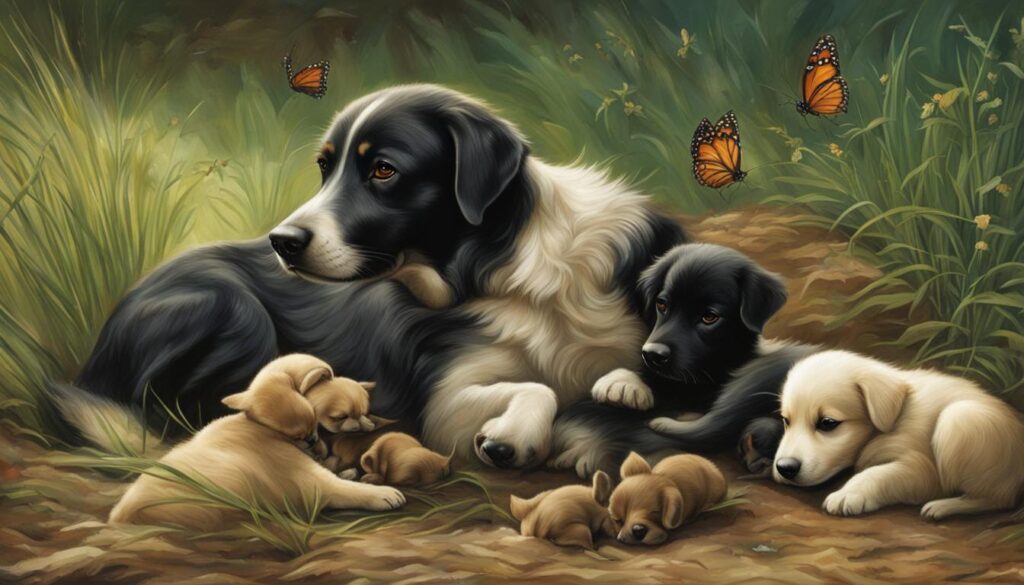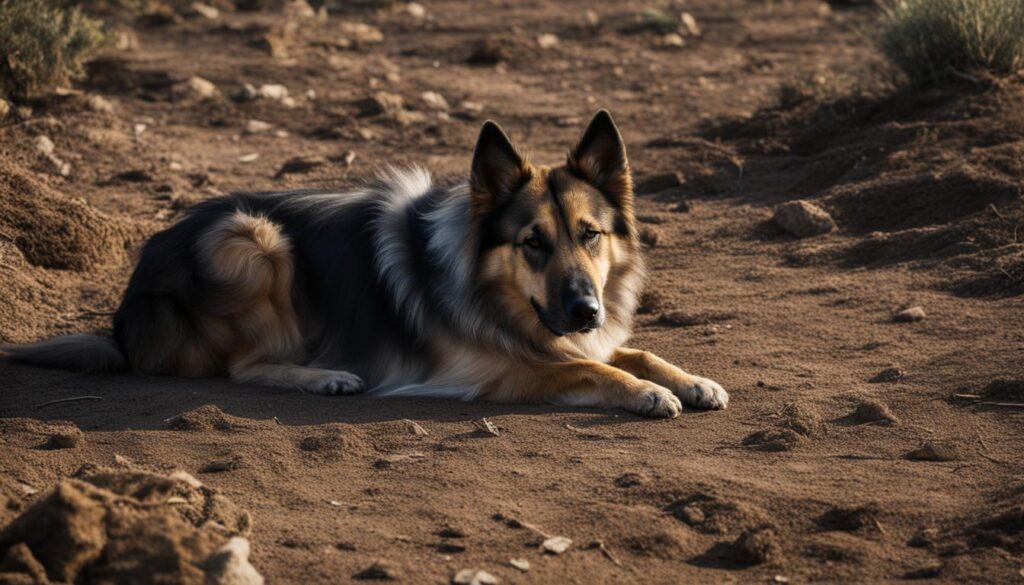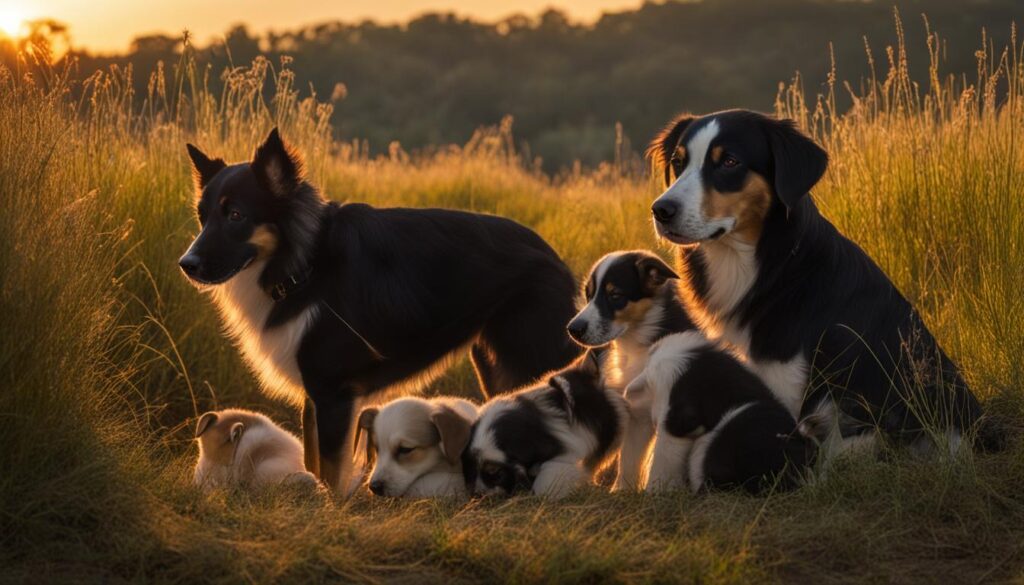Do you ever wonder why dogs hide their dead puppies? This instinctual behavior is a part of the natural traits that are inherited from their ancestral behaviors. Burial of dead puppies is more than just emotional processing as it involves a complex behavior. People living with dogs may develop strong and deep connection that parting with each other is painful.
Dogs display a number of instinctual behaviors, such as burying their dead puppies. In this way understanding such behavior gives us insight into their complicated behaviors and capacity for emotions. It also makes it possible for us to offer solace and make our dogs comfortable in their period grief.
Key Takeaways:
- The dogs bury their dead puppies as a result of the instincts that come out from his ancestral traits.
- One of the ways that dogs deal with grief is by burying puppies.
- Mother dogs usually display burial tendencies because of instinctive motherhood and defense against predators.
- In this regard, human beings can make comfort and create a caring atmosphere for dogs when they have lost their loved one.
- Sometimes, assistance from professionals might be needed in order for the dogs to overcome their stage of mourning.
Burying – The Natural Instinct in Dogs
Have you ever seen your dog dig a hole in the backyard and bury something? Naturally, dogs bury items. The burying instinct in dogs is based on the ancestral behavior. Dogs used to hide food and other things in order for them not be eaten by others animals during the night or they can consume it some time later.
This behavior is not exclusive to food or toys burial. Dogs also bury their dead puppies. The unavoidable nature of dog burying behavior rests with its instinctual drive and has been noted in varied breeds.
There is a well-documented basic canine behavior that dogs have. One of the many things that our furry friends do is burying. It is also interesting to observe a dog’s natural behavior of burying things since it represents how their behaviors have developed over time.
This burying instinct in dogs extends beyond the material domains. If a dog dies because of puppy mortality, the pregnant canine protects the dead baby by burying it to conceal from animals and other external components. It is a moving illustration of the motherly love and defensive qualities.
It would be important to understand dog burying instincts and its relation with canine behavior in knowing why dogs bury their dead pups.
Why Do Mother Dogs Bury Their Puppies?

But understanding why mother dogs would bury their puppies under such circumstances poses a challenge, given that it goes against the normal human behaviour of mourning. But such is a typical behavior for dog world, and there are several causes of this phenomenon.
Maternal instincts are one of the key reasons. Even if the offspring pass away, mother dogs have an instinct to groom and nurse their young ones. Covering their young ones with earth, mother dogs perhaps want to save them through the provision of a protected environment that is free from menaces and peril. Besides, burying the puppies acts like a way for mother dogs to get rid of any smell that may lead predators towards them.
One more possible reason that mother dogs bury their puppies is to stop disease. By covering the puppies, they minimize chances of infection and transmission of diseases which are very common in highly populated or unsanitary homes.
In general the behavior of mother dogs that bury puppies is a complex and instinctual behaviour based on underlying canine ethology. As a dog owner, respect and appreciate these behaviors even though they might look foreign or weird as humans.
Coping with Puppy Loss
The death of a newborn puppy can be very painful for a mother dog and burying the dead puppies is one way that nature allows them to cope with their grief. It brings closure and enables them to deal with their own emotions individually.
It is important to give your pet the freedom and time needed for them to mourn their loss naturally when looking at it as a dog owner. This may involve letting them have their space and creating a relaxing environment for them to sleep.
It also matters what kind of behavior your dog has during this period. They might turn and even start demonstrating symptoms of depression like lack of appetite or uninterest in the environment.
The best way to comfort your dog during this period is by giving them more love and attention. With spending quality time with your dog going for long walks and playing, he will feel loved and cared.
Recall that all dogs are unique and react differently to loss. Be patient and understanding as they go through this sensitive period.
“Grief is like the sea in which waves wash into and out; sometimes it moves so gently as to be unsteady but at other times, its sound makes you feel that your heart will hit the floor. All we can do is learn how to swim.”
– Vicki Harrison
Understanding Canine Mourning

Burying is one of the many behaviors that are exhibited by dogs when they have lost their puppies. Their grief is a normal coping mechanism for puppy loss. The whole process is even more complicated for the dogs—they are social animals with powerful maternal instincts.
Mourning in canines covers a wide range of emotions such as sadness, depression, and anxiety. Some dogs may lose interest in activities that were previously enjoyable, such as food consumption or playing games; others may become overly clingy. As pet owners, we should know to watch out for these symptoms and give the required care.
It is closely connected to dogs’ burial attitude. They can become very depressed when burying their dead puppies, and this procedure is considered helpful in accepting the loss. We can make them feel capable of processing their emotions deeply by helping and enabling the process in one’s own way.
All dogs do not mourn in the same way, which one should remember. It may take days, weeks or even months for others to mourn. Being a dog owner, we are obliged to be patient and provide appropriate care that ensures their restoration. Understanding the concept of canine mourning, which is a fundamental part of dog behavior and gives us more insight into who our four-legged friends really are.
The Significance of Puppy Burial
The act of dogs burying their deceased puppies is a natural behavior, but it means more than emotional processing as well. Let’s take a closer look at the reasons behind this behavior:
| Reason | Description |
|---|---|
| Hygiene | Dogs possess a natural tendency that makes them clean their living environment to stay neat and healthy. Burying their dead puppies acts as a cull (“culturing” or isolating) to disease and odor caused by decomposition. |
| Protection | By burying their puppies, they also are never caught off-guard if a predator or scavenger happens to be looking for an easy lunch. That is why, by burying their puppies since these canines are the potential prey for other animal. If they leave them anyplace in open as last mother dwelt there, it makes the chance of more vulnerable attention. |
| Minimizing the Risk of Disease Communication | At times, the death of a puppy might have been due to infectious disease. By burial of their puppies, the dogs also contribute in quarantine segregation whereby they reduce contagion through prevention from spreading among other members equally within the nest or location itself. |
The causes of this behavior are not only important because they shed light on the canine instinct but also help us deal with one suffering from such a loss. Through the acceptance of puppy burial we encourage our dogs to mourn and give them love they need in a hard time.
Other Instinctual Behaviors in Dogs
One of the many instinctual behaviors that dogs have is burying their departed puppies. It is important to appreciate these behaviors in order to understand canine behavior and the natural instincts of dogs. Here are some additional behaviors observed in dogs and how they contribute to the survival of dogs in nature:
Notably, each canine’s behavior is individual and such features may be exaggerated in certain breeds or dogs. The understanding of such instinctive behaviors helps pet owners to create the adequate conditions for training, care and living environment.
Factors Influencing the Burying Behavior
It should be noted that the act of burying dead puppies is an instinctive behavior in dogs. Nevertheless, many factors influence their choice of burying offspring who have died.
Environmental Conditions
The surroundings that a dog has can help contribute to its decision of burying their puppies. For example, if the ground is too hard to dig through, the dog may try burying its puppy in other ways like covering it with debris or hiding it in a crevice.
The Dog’s Maternal Instincts
Nature directs a mother dog’s instinct to defend its litter from predators. The maternal feelings that they have may make them bury their puppies away from possible dangers. Furthermore, a mother dog may dig burrows to prevent her healthy puppies from associating with their deceased litter mates.
Presence of Other Animals
Other animals can also influence a dog’s decision to bury the puppies. Domesticated dogs may not be as smelly, but the instinct remains. Other animals such as coyotes serve to make the dog bury her puppies because she does not want any predator lurking on them.
The factors such as environment, the maternal instincts of dogs and other animals in organization can encourage a dog to bury their fallen puppies.
Human Support for Dogs in Mourning
It is worth mentioning that the dogs may remain mourning for a long time and, therefore, humans can help to provide support. You can help your dog to feel better just by being there. They might value physical contact, including cuddling or petting, that can assist them in dealing with their sadness. Secondly, establishing a peaceful and serene setting can contribute to the dog’s increased comfort level during this sensitive phase.
Alternatively, you can do things that your dog loves doing other than taking them for walks or providing their favorite toys. Although it can be challenging to watch your dog go through this phase of mourning, the love and support given will help them deal with their emotions thus heal gradually.
A dog grieves equally as personally and diversely to humans.
It is important to note that every individual dog will mourn differently and their grieving process might not be as expected. Seek professional assistance if you notice that your dog is struggling for an unusual amount of time or displaying abnormal behavior. The services of a veterinarian or an animal behaviorist can provide ways to deal with the loss in puppy along with additional resources for maintaining emotional stability on your dog.
Professional help for a Grieving Dog
In case your dog remains grieving over the loss of their puppies for a long time or in too intense way, this needs professional intervention. The human support alone may not be enough to deal with puppy loss for dogs, and this can cause a lot of emotional pain.
In order to help your canine friend deal with the mourning period, a vet or an animal behaviorist may offer additional resources and assistance. They can also suggest treatments such as grief counseling for pet loss or environmental changes to promote healing in dogs.
It should be noted that every dog is unique and may require specific care and attention. Thus, professional support can guide you and your pet through this difficult period.
When to Seek Professional Help
Here are some signs that indicate it may be time to seek professional help for your grieving dog:
- Here are some signs that indicate it may be time to seek professional help for your grieving dog:
- Your dog shows no appetite or lacks energy for a long time.
- These behaviors have changed into either increased aggression or withdrawal.
- They no longer participate in activities that brought them pleasure
- The grief affects their health and general well-being
It’s Our Time to Give Love and Support to Our Grieving Dogs

After knowing why a dog buries away its deceased puppy, you can give your furry friend support during the time of mourning. It is important to note that interring the deceased offspring goes hand in hand with natural instincts for dogs and process emotions. In the case of noticeably prolonged and intense grief, you might have to request assistance from professionals such as a vet or an animal behaviorist.
Recognizing and promoting your dog’s natural instincts of grieving can allow you to establish a stronger connection with this furry friend. Do not forget to make your dog comfortable and provide it with a nurturing atmosphere while grieving their puppies’ death.
I thank you for getting to know why do dogs bury their puppies. We are confident that this article has shed some light on the complexities of dog behavior and emotional processing.
Frequently Asked Questions
For what reason do dogs bury their dead puppies?
A natural instinct that comes from the ancestor life of dogs, is their burying dead puppies. Firstly, burying serves as a way to protect the deceased puppies from predators and provides dogs with an outlet for grief allowing them to process their emotions.
Why are instincts buried in dogs?
In turn, the burying instinct in dogs is related to ancestral activities. The burying behaviour has different functions that include hiding food from scavengers, secure valuable items and preservation of the prey to be consumed at a later date for dogs.
What motivates mother dogs to bury their puppies?
Mother dogs tend to bury their dead puppies as an innate response. This behavior is often motivated by the desire to preserve deceased puppies from predators and maintain their scent hidden, reducing possible attracting undesired attention.
What do dogs do when they lose a puppy?
Dogs who lose their puppies bury them as a way to deal with the pain. In addition to burying the puppies, dogs can be able to process their emotions and closure so they will be able manage grief associated with offspring loss.
Are dogs grieving when they lose their puppies?
Yes, dogs grieve over the loss of their puppies. Dogs’ mourning activities may involve burial of deceased puppies, depression-like reactions and alteration in appetite or sleep routine beside seeking comfort from their owners.
Then, for dogs what is the importance of burying puppies?
Puppy burial concerns dogs beyond emotional processing. Burial improves hygiene, stops the disease spread and avoids inciting predators or scavengers toward gone puppies’ location.
What other instinctual behaviors can be observed in dogs?
Various instinctive behaviors are displayed by dogs such as marking territories, hunting, herding and digging. All of these behaviors have a distinct role to play in their survival instincts, and they tend to differ with the breed as well as individual personality.
What drives a dog to bury?
There are various elements that may influence the decision of a dog to bury their dead puppies such as environmental circumstances, maternal instincts, different living creatures and individual lives.
How can humans help dogs cope with grief?
When dogs grieve the death of their puppies, with regards to coping a suitable environment is formed for support through comfort care additional attention and affection maintained regular routine as well activities that help alleviate grief loss.
When do the grieving dogs need a professional case?
Though mourning is a normal state of mind for dogs, sometimes professional assistance must be sought. Such as, when a dog shows signs of an extended period of mourning such as loss appetite or withdrawal from daily activities.
Here at ILoveChihuahua, we share our personal experiences as owners of this feisty breed. We talk about recommended methods, dog supplies picks, and advice on common Chihuahua problems. Our goal is to promote responsible dog ownership, so there would be fewer Chihuahuas in shelters.


